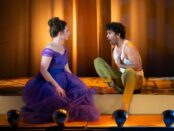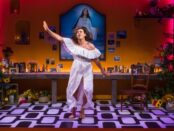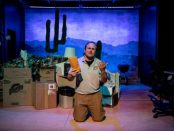As his mother Bete (pronounced Bet–chi), Soria is bigger than life without a great deal of assistance from props, costuming or make-up. When he enters carrying an offering to the stage which is set up like a tropical altar to Iemanja, the Afro-Cuban diety whose picture is on the wall center stage, he is wearing a white linen skirt which he suddenly pulls up and it becomes his mother’s dress (designed by Haydee Zelideth). In English punctuated with pungent Spanish and Portuguese, sometime translated, often as not left unexplained, Bete tells us of her three marriages, each one unfulfilling, and of her children, her difficult son Arturo who from a young age wanted to dance ballet and was always getting into trouble, and his sister who always liked sports. We learn of her unconventional child rearing practices which was as much a tug of war with her children as it was a series of lessons in living, and marked Arturo for life.
[more]





